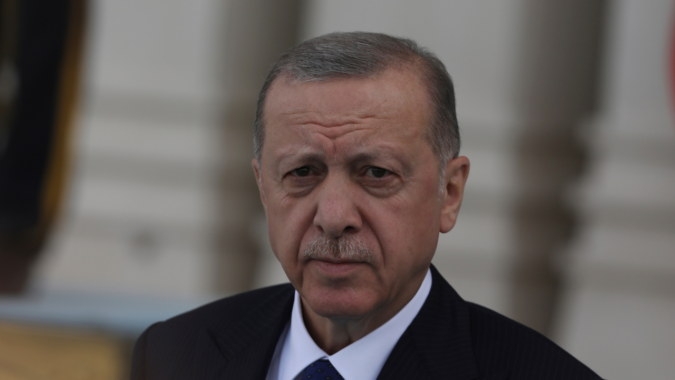ISTANBUL: Turkish President Recep Tayyip Erdogan said for the first time Sunday that Ankara could accept Finland into Nato without its Nordic neighbour Sweden.
Erdogan’s comments during a televised meeting with younger voters came days after Ankara suspended Nato accession talks with the two countries.
Its decision threatened to derail Nato’s hopes of expanding the bloc to 32 countries at a summit planned for July in the Lithuanian capital Vilnius.
Finland and Sweden dropped decades of military non-alignment and applied to join the US-led defence alliance in response to Russia’s invasion of Ukraine.
Turkey and Hungary remain the only members to have failed to ratify the two bids by votes in parliament.
The Hungarian legislature is expected to approve both bids in February.
But Erdogan has dug in his heels heading into a tightly contested May 14 election in which he is trying to energise his conservative and nationalist support base.
Erdogan’s main complaint has been with Sweden’s refusal to extradite dozens of suspects that Ankara links to outlawed Kurdish militants and a failed 2016 coup attempt.
He drew a clear distinction on Sunday between the positions taken by Sweden and Finland in the past few months.
“If necessary, we can give a different response concerning Finland. Sweden will be shocked when we give a different response for Finland,” Erdogan said.
He also repeated his demand for Sweden to hand over suspects sought by Ankara.
“If you absolutely want to join Nato, you will return these terrorists to us,” Erdogan said.
Sweden has a bigger Kurdish diaspora than Finland and a more serious dispute with Ankara.
Both countries have been trying to break down Erdogan’s resistance through months of delicate talks.
Sweden has approved a constitutional amendment that enables it to enact tougher anti-terror laws demanded by Ankara.
And both nations have lifted bans on military sales to Turkey that they imposed after its 2019 military incursion into Syria.
But Ankara reacted with fury to a decision by the Swedish police to allow a protest at which a far-right extremist burned a copy of the Koran outside the Turkish embassy in Stockholm earlier this month.
Ankara has also been outraged by a Swedish prosecutor’s decision not to press charges against a Kurdish support group that hung an effigy of Erdogan by its ankles outside Stockholm City Court.
Swedish officials have roundly condemned the protests but defended their country’s broad acceptance of free speech.
The standoff between Ankara and Stockholm prompted Finnish officials to hint for the first time last week that they might be forced to seek Nato membership without Sweden.
The two nations had sought to join the bloc together from the start.
“We have to assess the situation, whether something has happened that in the longer term would prevent Sweden from going ahead,” Finnish Foreign Minister Pekka Haavisto said last Tuesday.
But Haavisto also stressed that a joint accession remains the “first option”.
Erdogan’s comments during a televised meeting with younger voters came days after Ankara suspended Nato accession talks with the two countries.
Its decision threatened to derail Nato’s hopes of expanding the bloc to 32 countries at a summit planned for July in the Lithuanian capital Vilnius.
Finland and Sweden dropped decades of military non-alignment and applied to join the US-led defence alliance in response to Russia’s invasion of Ukraine.
Turkey and Hungary remain the only members to have failed to ratify the two bids by votes in parliament.
The Hungarian legislature is expected to approve both bids in February.
But Erdogan has dug in his heels heading into a tightly contested May 14 election in which he is trying to energise his conservative and nationalist support base.
Erdogan’s main complaint has been with Sweden’s refusal to extradite dozens of suspects that Ankara links to outlawed Kurdish militants and a failed 2016 coup attempt.
He drew a clear distinction on Sunday between the positions taken by Sweden and Finland in the past few months.
“If necessary, we can give a different response concerning Finland. Sweden will be shocked when we give a different response for Finland,” Erdogan said.
He also repeated his demand for Sweden to hand over suspects sought by Ankara.
“If you absolutely want to join Nato, you will return these terrorists to us,” Erdogan said.
Sweden has a bigger Kurdish diaspora than Finland and a more serious dispute with Ankara.
Both countries have been trying to break down Erdogan’s resistance through months of delicate talks.
Sweden has approved a constitutional amendment that enables it to enact tougher anti-terror laws demanded by Ankara.
And both nations have lifted bans on military sales to Turkey that they imposed after its 2019 military incursion into Syria.
But Ankara reacted with fury to a decision by the Swedish police to allow a protest at which a far-right extremist burned a copy of the Koran outside the Turkish embassy in Stockholm earlier this month.
Ankara has also been outraged by a Swedish prosecutor’s decision not to press charges against a Kurdish support group that hung an effigy of Erdogan by its ankles outside Stockholm City Court.
Swedish officials have roundly condemned the protests but defended their country’s broad acceptance of free speech.
The standoff between Ankara and Stockholm prompted Finnish officials to hint for the first time last week that they might be forced to seek Nato membership without Sweden.
The two nations had sought to join the bloc together from the start.
“We have to assess the situation, whether something has happened that in the longer term would prevent Sweden from going ahead,” Finnish Foreign Minister Pekka Haavisto said last Tuesday.
But Haavisto also stressed that a joint accession remains the “first option”.
